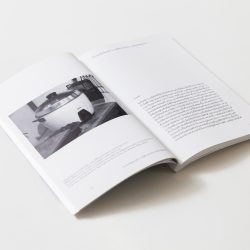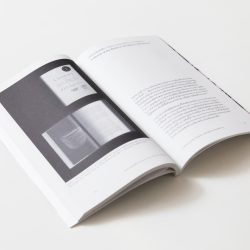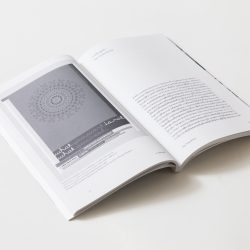A COLLECTION OF ESSAYS ON DESIGNING, DESIGN AND DESIGNERS BY JUTHAMAS TANGSANTIKUL MAKES AN OBSERVATION THAT ‘WRITING’ IS A PROCESS THAT ALLOWS FOR HER TO DISCOVER AND MATERIALIZE IDEAS RATHER THAN A TRANSMISSION OF WHAT SHE HAS FOUND TO THE READERS

Juthamas Tangsantikul
CommDe Publication, 2018
Paperback, 144 pages, 15.3×23 cm
ISBN 978-6-16407-287-9
TEXT: PAPHOP KERDSUP
PHOTO: KETSIREE WONGWAN
(For English, please scroll down)
ตอนหนึ่งในบทนำของ ‘ย้อน คิด อ่าน เขียน / Recollection : รวมบทความว่าด้วยการออกแบบ งานออกแบบ และนักออกแบบ’ จุฑามาศ ตั้งสันติกุล ตั้งข้อสังเกตว่า “การเขียน” สำหรับเธอแล้ว เป็นกระบวนการที่ทำให้ได้ค้นพบและตกผลึกทางความคิดมากกว่าที่จะเป็นการถ่ายทอดสิ่งที่ถูกพบนั้นออกไปยังผู้อ่านเพียงลำพัง และขยายความว่าแนวทางดังกล่าวสามารถเชื่อมโยงกลับไปยังแนวคิดเรื่องการสะท้อนคิด (reflective thinking) ของ David Schön และตัวแทนของการเรียนรู้ (representation of learning) ของ Jennifer Moon ผ่านสิ่งที่เรียกว่า “การเขียนสะท้อนคิด” (reflective writing) หรือการเขียนถึงประสบการณ์ที่เกิดขึ้นไปแล้ว เพื่อที่จะได้ทำความเข้าใจความหมายของประสบการณ์นั้นๆ ได้ ซึ่งบทนำของหนังสือเล่มนี้ ได้ทำหน้าที่เดียวกันในการสะท้อนกลับไปย้อนมองบทความทั้ง 9 ตั้งแต่ปี 2006-2014 ของจุฑามาศ เพื่อสำรวจกระบวนและพัฒนาการทางความคิดของเธอเอง
ข้อสังเกตหนึ่งที่น่าสนใจในงานเขียนของจุฑามาศ คือการบอกเล่าเรื่องราวและตั้งคำถามต่องานออกแบบที่สัมพันธ์ไปกับชีวิตประจำวัน ประวัติศาสตร์ของผู้คน และข้าวของสามัญ (ไม่) ธรรมดา บทความที่น่าสนใจใน ‘ย้อน คิด อ่าน เขียน’ นอกเหนือไปจากการกล่าวถึงชีวประวัติของหม้อหุงข้าวและความสัมพันธ์ของมันที่มีต่อบริบททางสังคมวัฒนธรรมแล้ว บทความขนาดสั้นที่เขียนให้กับนิทรรศการของพิม สุทธิคำ ในปี 2011 ในชื่อ Domestication และบทวิจารณ์หนังสือ History of the World in 100 Objects ของ Neil MacGregor ซึ่งเคยตีพิมพ์ใน art4d ปี 2012 ก็ชวนให้เราได้ย้อนกลับมามองบทบาทของข้าวของในชีวิตประจำวันที่รายล้อมอยู่รอบตัวเรา และผลกระทบของมันที่มีต่อเราตั้งแต่ในระดับบุคคลถึงสังคม


A section of the preface for ‘Recollection: A collection of essays on designing, design and designers’ by Juthamas Tangsantikul makes an observation that ‘writing’ is a process that allows for her to discover and materialize ideas rather than a transmission of what she has found to the readers. Tangsantikul further elaborated that such approach can be traced back to the concept of ‘reflective thinking’ by David Schön and Jennifer Moon’s ‘representation of learning’ through reflective writing, which revolves around writing about a past experience in order to understand the meaning of it. The prologue of this book serves this same role as it takes a retrospective look at the nine essays Tangsantikul had written between 2006 and 2014 to explore the process and development of her own ideas and thinking.
An interesting thing about Tangsantikul’s writing is the way that she questions and tells stories about design in relation to people’s everyday lives, history and (un) ordinary objects. The pieces selected for ‘Recollection’ encompass a biography of a rice cooker and its relationship with the social and culture context to a short essay Tangsantikul wrote for Pim Sudhikham’s exhibition in 2011, ‘Domestication,’ and the review of Neil MacGregor’s book, ‘History of the World in 100 Objects,’ which was published in art4d back in 2012. All and all, her works make us take a look back at the mundane, everyday objects and the effects they have on us at both the individual and societal levels.




